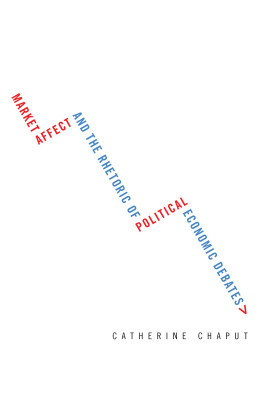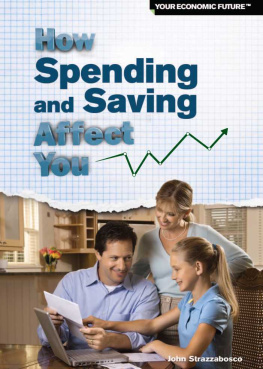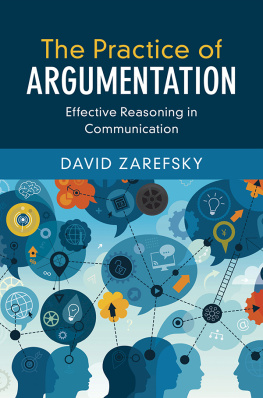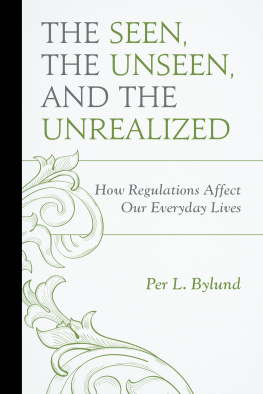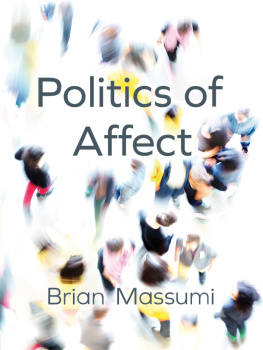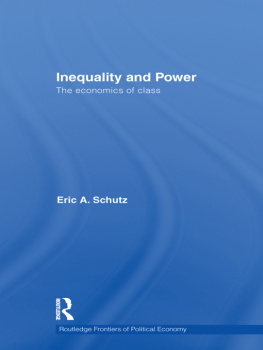
Market Affect and the Rhetoric of Political Economic Debates
Studies in Rhetoric/Communication
Thomas W. Benson, Series Editor
Market Affect and the Rhetoric of Political Economic Debates
Catherine Chaput

2019 University of South Carolina
Published by the University of South Carolina Press
Columbia, South Carolina 29208
www.sc.edu/uscpress
28 27 26 25 24 23 22 21 20 19
10 9 8 7 6 5 4 3 2 1
Library of Congress Cataloging-in-Publication Data
can be found at http://catalog.loc.gov/.
ISBN 978-1-61117-994-1 (hardback)
ISBN 978-1-61117-995-8 (ebook)
Front cover design by Faceout Studio, Spencer Fuller
Contents
Introduction:
A Genealogy of Affect in Market Thinking |
Series Editors Preface
In Market Affect and the Rhetoric of Political Economic Debates, Catherine Chaput asks how capitalism as an idea and a system has resisted criticism in the rhetorical public sphere. Her investigation traces the debate by pairing a series of advocates of capitalist theory and free markets with a major critic of eachAdam Smith and Karl Marx, John Maynard Keynes and Thorstein Veblen, Friedrich Hayek and Theodor Adorno, Milton Friedman and John Kenneth Galbraith. In each case, argues Chaput, the critics of capitalism fall short in the rhetorical encounter because they allow their own arguments to be staged in and limited to the realm of ideology, material power, and rational choice. Chaput reasons that the much-needed critique of capitalism has been handicapped by its failure to understand the affective biopolitics of capitalism, a realm of analysis most fully explored by Michel Foucault. Affect theory, states Chaput, offers the possibility for a reinvigorated rhetoric of affective democratic critique and governance.
THOMAS W. BENSON
Acknowledgments
I would like to thank the editorial staff at the University of South Carolina Press. They have been incredibly responsive, helpful, and professional throughout this process. There are some exceptional colleagues in rhetoric who deserve my thanks. Robert Asen, M. Lane Bruner, Ronald Greene, Mark Longaker, and Brian Ott all volunteered to read this manuscript even among so many other pressing obligations. Each of you represents the kind of scholarone with equal doses of curiosity and generositythat I hope to become. Additionally, I wish to thank the anonymous reviewers of the manuscript. Their nuanced reading and insightful comments demonstrated a careful engagement with my ideas, for which I am grateful. I am fortunate to have a local community of such commentators in my colleagues in the Department of English at the University of Nevada, Reno, and especially in the rhetoric and composition faculty. I have learned much from them as well as the graduate students with whom I have worked. I am particularly indebted to the informal reading group of graduate students and faculty who have studied Marx and Foucault with me. These discussions have sometimes been fast-paced and dynamic while at other times they have been thoughtful and lighthearted, but they have always been intellectually and personally fulfilling to me. A final thanks goes to my family and, in particular, to Madeline Chaput, who has become my touchstone in the world, reminding me that is it easier to theorize change than to practice it.
Introduction
A Genealogy of Affect in Market Thinking

O n a Sunday, a little more than a week before the August 2011 deadline for Congress to raise the United States debt ceiling or risk defaulting on our national obligations, the news media highlighted neither the Democrats nor the Republicans as rhetorical actors in this historical scene. Instead, the agent was the ephemeral entity we have placed our faith in for over two hundred years: the market. CNNs correspondent contended that the market, in fact, was the only adult at the discussion. The Democratic and Republican leadership were cast as children who placed their interests and agendas above economic laws. It was, therefore, up to the market to ensure a debt-ceiling increase and free finance capital from arbitrary constraints. That same Sundays New York Times featured an article on the American diet that staged its argument similarly: healthier eating habits and healthcare cost savings would be accomplished by the market on its own accord. Here too the human agents of change were absent. In short, the news media that day declared that the market would negotiate our federal budget and implement a better national diet. This is far from anomalous. The economic imaginary present in these examples pervades contemporary political economic and cultural landscapes, distancing human agents from their social and individual choices.
These two examples and others like them simultaneously exemplify Adam Smiths invisible-hand metaphor and Marxs notion of alienation. Smith, the adopted father of free-market capitalism, is perhaps most remembered for his theory that conscious decisions to plan the economy often backfire. Deliberate interventions interfere with natural market processes that operate as though they were guided by an overarching invisible hand. His theory characterizes economic agency as an invisible force that silently instructs. For Marx, these extrahuman qualities derive from the markets origins in the human mind; the market, he says, is the alienated power of human beings. Human beings abdicate their world-making responsibilities by externalizing them within the fantasy of market forces. As we place our faith in this all-knowing construct, we displace our own agentive powers. The market shapes our political lifemaking decisions about the national debt, for instancejust as much as it contours our everyday livesdetermining whether we make healthy lifestyle choices, to use the other example. The market comes to the table, acts appropriately, and determines future courses of action. A tried and true political economic agent, the market not only exists but thrives and proliferates. The question that needs to be answered, the question that underscores this book, is not whether the market exists but what the market is and how it cajoles so invisibly, effortlessly, and yet authoritatively.
At least part of the answer, the part on which I focus, suggests that the market is an affective force that influences rhetorical action by linking bodily receptivities to economic persuasion. The market feels real because it is the nominalization we give to the very real affective energies circulating throughout our lived experiences. An often-slippery concept, affect signifies a set of theories tracking diverse relationships among emotion, sensation, and everyday practices. Affect studies, across a range of approaches, has reinvigorated explorations of peoples conscious and unconscious behaviors that had more or less come to an explanatory impasse in theories of ideology. In the Marxist tradition, ideological criticism presupposes an economic base that supports a multiplicity of cultural and political practices in the superstructure. Ideological inclinations, that is, derive from the specifics of our daily economic relations. Unmasking these causal relationships produces a different consciousness and thus different life patterns. Affect theory complicates this connection between materiality and consciousness by exploring the unconscious bodily mediations that influence how we understand and interact with the material world prior to conscious thought.
Next page
